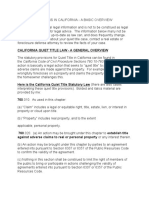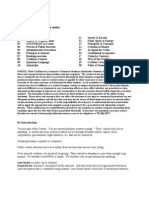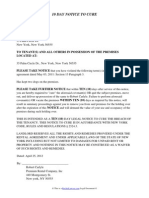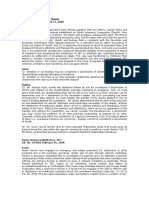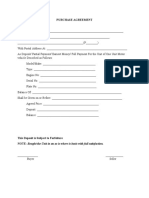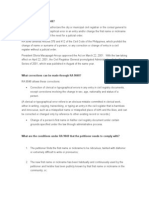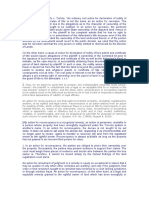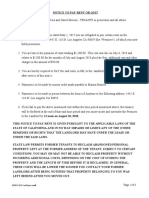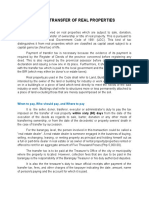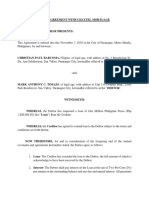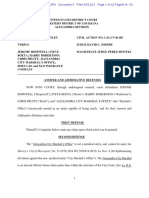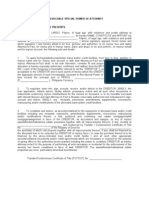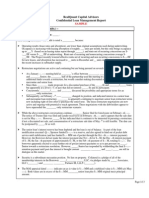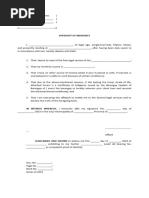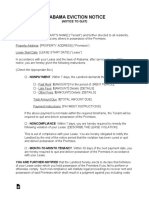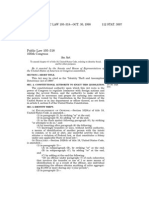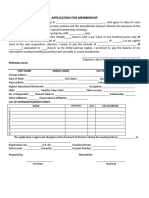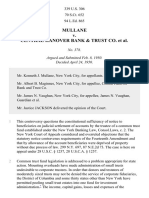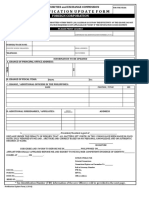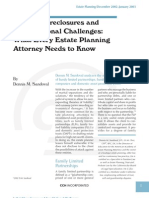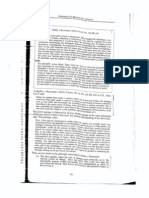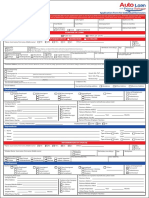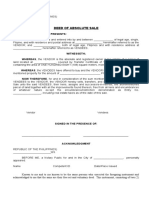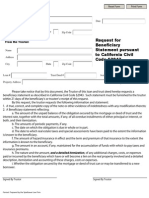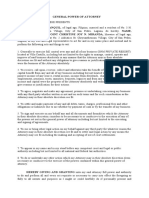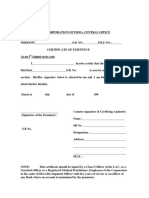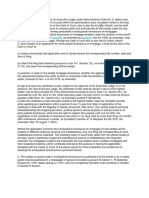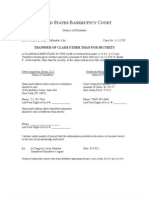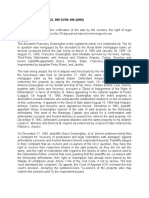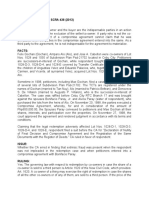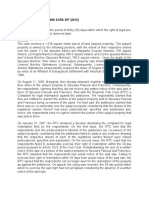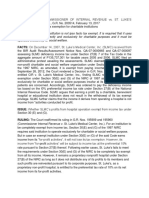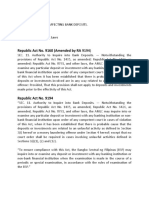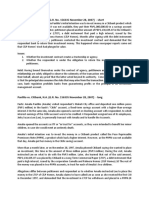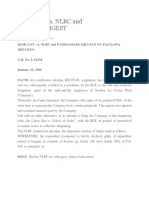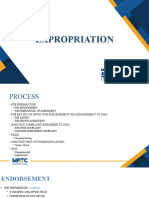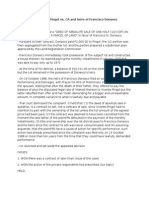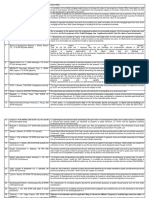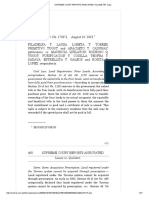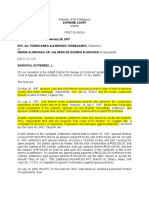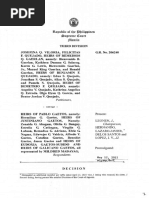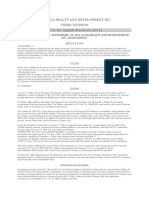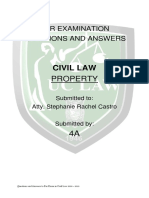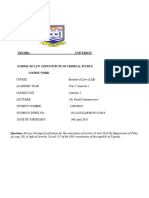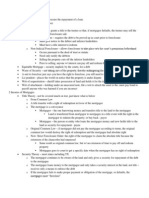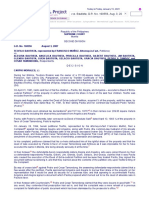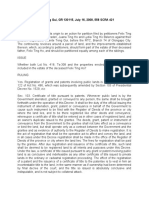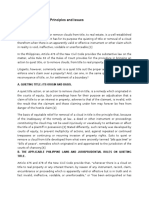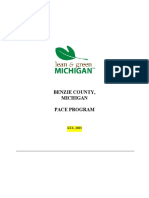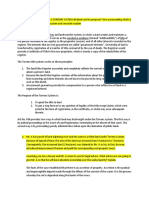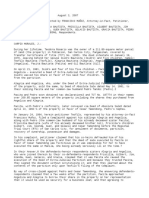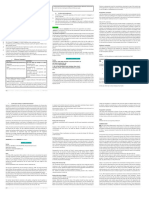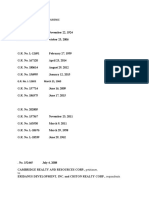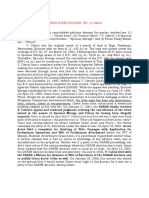0 ratings0% found this document useful (0 votes)
117 viewsLand Title and Deeds - Facts
Land Title and Deeds - Facts
Uploaded by
Red HoodA land title is the evidence of a land owner's right to exclusive possession and enjoyment of the property, as documented in the Certificate of Title. A land title differs from a deed, which grants or conveys land from one person to another. Obtaining a land title through registration is important because it establishes legal proof of ownership. The certificate of title contains the owner's name and details, a technical description of the land, and annotations of transactions. Regional Trial Courts have jurisdiction over land registration under the Torrens system, which aims to establish clear land titles.
Copyright:
© All Rights Reserved
Available Formats
Download as PDF, TXT or read online from Scribd
Land Title and Deeds - Facts
Land Title and Deeds - Facts
Uploaded by
Red Hood0 ratings0% found this document useful (0 votes)
117 views13 pagesA land title is the evidence of a land owner's right to exclusive possession and enjoyment of the property, as documented in the Certificate of Title. A land title differs from a deed, which grants or conveys land from one person to another. Obtaining a land title through registration is important because it establishes legal proof of ownership. The certificate of title contains the owner's name and details, a technical description of the land, and annotations of transactions. Regional Trial Courts have jurisdiction over land registration under the Torrens system, which aims to establish clear land titles.
Original Description:
10 Important Facts You Should Know
Copyright
© © All Rights Reserved
Available Formats
PDF, TXT or read online from Scribd
Share this document
Did you find this document useful?
Is this content inappropriate?
A land title is the evidence of a land owner's right to exclusive possession and enjoyment of the property, as documented in the Certificate of Title. A land title differs from a deed, which grants or conveys land from one person to another. Obtaining a land title through registration is important because it establishes legal proof of ownership. The certificate of title contains the owner's name and details, a technical description of the land, and annotations of transactions. Regional Trial Courts have jurisdiction over land registration under the Torrens system, which aims to establish clear land titles.
Copyright:
© All Rights Reserved
Available Formats
Download as PDF, TXT or read online from Scribd
Download as pdf or txt
0 ratings0% found this document useful (0 votes)
117 views13 pagesLand Title and Deeds - Facts
Land Title and Deeds - Facts
Uploaded by
Red HoodA land title is the evidence of a land owner's right to exclusive possession and enjoyment of the property, as documented in the Certificate of Title. A land title differs from a deed, which grants or conveys land from one person to another. Obtaining a land title through registration is important because it establishes legal proof of ownership. The certificate of title contains the owner's name and details, a technical description of the land, and annotations of transactions. Regional Trial Courts have jurisdiction over land registration under the Torrens system, which aims to establish clear land titles.
Copyright:
© All Rights Reserved
Available Formats
Download as PDF, TXT or read online from Scribd
Download as pdf or txt
You are on page 1of 13
Here are 10 important facts you
should know about Land Titles :
What is a Land Title?
A land title is the evidence of the
right of the owner or the extent of
his/her interest, and by which means
he/she can maintain control and as a
rule assert right to exclusive
possession and enjoyment of the
property. The document is entitled
the Certificate of Title. (Pea,
Registration of Land Titles and
Deeds, Revised Edition, 1988).
Is a land title different from a deed?
Yes. Land title refers to the evidence of the
right of the owner while deed refers to a
written document executed in accordance
with law, wherein a person grants or
conveys to another a certain land. (Pea,
Registration of Land Titles and Deeds,
Revised Edition, 1988)
Examples of a deed: Deed of sale, deed of
donation, deed of mortgage, lease
contracts, etc
Why is a land title important?
Land title is important because it is
the only document that would
prove a persons ownership over a
piece of land.
What information is contained in the certificate
of title?
The certificate of title contains the following: (
Aquino, Amado D., Land Registration and
Related Proceedings, Revised Edition, 1997)
-The full name of the owner, including the civil
status, and the name of the spouse if married,
the nationality and residence and postal
address;
-Technical description of the land; and
-Annotations of the transactions made by the
owner and other pertinent information.
What is the limitation on
certificates of title?
A certificate of title shall not be
subject to collateral. It cannot be
altered, modified or cancelled
except in a direct proceeding in
accordance with law. (Pres. Decree
No. 1529, Sec. 48).
What document is issued to the
registered owner of the land?
The owners duplicate Certificate
of Title is issued by the Register of
Deeds in the name of the person in
whose ownership of the land was
decreed and this is given to the
registered owner. (Pres. Decree No.
1529, Sec. 41).
In cases of co-ownership, can each co-
owner have a copy of the duplicate
certificate of title?
Yes. A separate duplicate certificate of
title may be issued to each of the co-
owner in the same form. The Register
of Deeds shall note on each certificate
of title a statement as to whom a copy
was issued. (Pres. Decree No. 1529,
Sec. 41)
What is land registration?
Land Registration is the process
wherein the state provides a public
record of the land title itself upon
which a prospective purchaser or
someone else interested may rely.
(Pea, Registration of Land Titles
and Deeds, Revised Edition, 1988).
What is the purpose of land
registration under Torrens system?
The real purpose of the system is
to quiet title of land; to put a stop
to any question of the legality of
the title, except claims, which were
noted at the time of registration.
(Pea, Registration of Land Titles
and Deeds, Revised Edition, 1988).
What court has the jurisdiction
over the registration of title?
The Regional Trial Courts now have
plenary jurisdiction over land
registration proceedings.
Do I need to take care or protect my land titles?
Obviously, your property needs to have a title, if you
are going to sell your property and proceed with the
transfer of ownership.
When properties are mortgaged, the original owners
duplicate certificate of titles are kept in a safe and
secure place by the bank/lending institution. They put
it in a fire-proof safe or vault that is in a flood-free area,
so its safe to say they are safe and sound.
However, if your property is already fully-paid, you
should already have the original owners duplicate
certificate of the title, and it becomes your
responsibility to keep it in a safe and secure place. I
suggest that you keep them in a safety deposit box
(SDB) in a bank not too near your home.
Whats the difference between reconstitution and
replacement?
If the original title with the registry of deeds got lost or
destroyed, then reconstitution of the title would be necessary.
This can be either through an administrative reconstitution or a
judicial reconstitution.
On the other hand, if only the owners duplicate certificate got
lost/destroyed, and the copy at the register of deeds is intact,
then the owner only needs to get a replacement for the lost
duplicate certificate, through the procedure stated in Section
109 of Presidential Decree (P.D.) No. 1529 (Property Registration
Decree)
It is through having the right information that you can ensure
youre not setting yourself up for a ton of headache after buying
a new property. Dont forget to keep a copy of all the papers
youve received during and after the home buying process to
protect your investment or for your future reference.
You might also like
- Redeem Property in MIchiganDocument3 pagesRedeem Property in MIchiganDantes Kebreau100% (1)
- CH 4 Gobc 2019 1Document6 pagesCH 4 Gobc 2019 1armaan100% (1)
- Quiet Title Actions in CaliforniaDocument10 pagesQuiet Title Actions in Californiafilmdude100% (2)
- 0 Living Temple Class Notes Through 20Document67 pages0 Living Temple Class Notes Through 20gdagreat100% (3)
- Fixed LeaseDocument9 pagesFixed LeaseMikeNo ratings yet
- UTI Transaction SlipDocument2 pagesUTI Transaction SlipSanjay Puri0% (1)
- New York Eviction NoticeDocument3 pagesNew York Eviction NoticeRocketLawyerNo ratings yet
- Corporation Law CasesDocument7 pagesCorporation Law CasesElerlenne LimNo ratings yet
- Purchase Agreement Deed of SaleDocument2 pagesPurchase Agreement Deed of SaleHiddentribe Puregold kioskNo ratings yet
- US SignUp Forms 9-9-9Document17 pagesUS SignUp Forms 9-9-9anysia0No ratings yet
- Correction of First NameDocument5 pagesCorrection of First Namejoeven64No ratings yet
- PropertyDocument2 pagesPropertyChristopher Martin GunsatNo ratings yet
- 2.SPECIAL POWER OF ATTORNEY LeslyDocument3 pages2.SPECIAL POWER OF ATTORNEY Leslyoshin saysonNo ratings yet
- TemplateDocument6 pagesTemplateMD SUMON MIAHNo ratings yet
- ReceiptDocument1 pageReceiptAngela BalarbarNo ratings yet
- Eviction NoticeDocument4 pagesEviction NoticeJuan Manuel LopezNo ratings yet
- Pascual v. Spouses Coronel and in Spouses Barias v. Heirs of Bartolome Boneo, Et Al.Document9 pagesPascual v. Spouses Coronel and in Spouses Barias v. Heirs of Bartolome Boneo, Et Al.Edz ZVNo ratings yet
- Transfer of Land: Nla - TR 1Document4 pagesTransfer of Land: Nla - TR 1Sherdene DaCosta-WalkerNo ratings yet
- U.S. Customs Form: CBP Form 4609 - Petition For Remission or Mitigation of Forfeitures and Penalties IncurredDocument1 pageU.S. Customs Form: CBP Form 4609 - Petition For Remission or Mitigation of Forfeitures and Penalties IncurredCustoms FormsNo ratings yet
- Tax On Transfer of Real PropertiesDocument8 pagesTax On Transfer of Real PropertiesKristine Astorga-NgNo ratings yet
- Inventory For 3 Bedroom Apartment TemplateDocument7 pagesInventory For 3 Bedroom Apartment TemplateAntonio Jose SuarezNo ratings yet
- Step-By-Step Corporate RegistrationDocument3 pagesStep-By-Step Corporate Registrationjen mikeNo ratings yet
- Short Sale Authorization To Release InfoDocument1 pageShort Sale Authorization To Release Infodrobin74No ratings yet
- Authority To Sell LetterDocument1 pageAuthority To Sell LetterDanica RafolsNo ratings yet
- SPA - Appear Case1Document1 pageSPA - Appear Case1jsafaithNo ratings yet
- Barcoma Contract of LoanDocument5 pagesBarcoma Contract of LoanMike Shaw100% (1)
- City Response To Whatley LawsuitDocument42 pagesCity Response To Whatley LawsuitKALB DIGITAL100% (1)
- SpaDocument3 pagesSpaAhcai SepetNo ratings yet
- Confidential Loan ManagementDocument13 pagesConfidential Loan Managementbrodyabe766549No ratings yet
- Affidavit of Indigency SampleDocument1 pageAffidavit of Indigency SampleRommel SalalimaNo ratings yet
- Change of NameDocument65 pagesChange of NameFaith Alexis GalanoNo ratings yet
- Diplomatic Immunity: (1991) 1 ALL ER 777Document3 pagesDiplomatic Immunity: (1991) 1 ALL ER 777Anand Kamal100% (1)
- Affidavit of Parental Advice To MarriageDocument1 pageAffidavit of Parental Advice To MarriagerushfireNo ratings yet
- Alabama Eviction Notice To Quit FormDocument3 pagesAlabama Eviction Notice To Quit Formeric cathcartNo ratings yet
- Petitioner Vs Vs Respondent Leo Luis P. Mendoza For Petitioner. Robiso & Reyes For RespondentDocument10 pagesPetitioner Vs Vs Respondent Leo Luis P. Mendoza For Petitioner. Robiso & Reyes For RespondentBiancaDiwaraNo ratings yet
- ZZZ ZZZZZZZZ ZZZZZZZZ ZZZZZZZZ ZZZZZZZZDocument6 pagesZZZ ZZZZZZZZ ZZZZZZZZ ZZZZZZZZ ZZZZZZZZArmond TrakarianNo ratings yet
- QuitDocument4 pagesQuitcaleb ebongNo ratings yet
- Application For Membership: Personal Data: First Name Middle Name Last NameDocument1 pageApplication For Membership: Personal Data: First Name Middle Name Last NameReshel BulcaseNo ratings yet
- Extrajudicial Settlement of An EstateDocument4 pagesExtrajudicial Settlement of An EstatePAMELA DOLINA100% (1)
- Mullane v. Central Hanover Bank & Trust Co., 339 U.S. 306 (1950)Document11 pagesMullane v. Central Hanover Bank & Trust Co., 339 U.S. 306 (1950)Scribd Government DocsNo ratings yet
- BassDrill Alpha - Information MemorandumDocument90 pagesBassDrill Alpha - Information MemorandumAnbuNo ratings yet
- Clouded Title Permanent Injunction To Foreclose Appeal 1987 TEXASDocument15 pagesClouded Title Permanent Injunction To Foreclose Appeal 1987 TEXASJohn ReedNo ratings yet
- Addendum To Lease AgreementDocument1 pageAddendum To Lease AgreementjasonNo ratings yet
- Notification Form Foreign CorporationDocument2 pagesNotification Form Foreign CorporationJenel ChuNo ratings yet
- Judicial Foreclosures and Constitutional Challenges: What Every Estate Planning Attorney Needs To KnowDocument9 pagesJudicial Foreclosures and Constitutional Challenges: What Every Estate Planning Attorney Needs To KnowElaine Diane EtingoffNo ratings yet
- Short Title, Extent and Commencement: Registration Act, 1908 Part I: PreliminaryDocument34 pagesShort Title, Extent and Commencement: Registration Act, 1908 Part I: PreliminaryMehul BharwadNo ratings yet
- Daniel Studin - Uniform Probate Code, Last Updated 2008Document629 pagesDaniel Studin - Uniform Probate Code, Last Updated 2008Daniel StudinNo ratings yet
- Eviction NoticeDocument1 pageEviction NoticeGaba, Yna MarieNo ratings yet
- Lawsuit Against Linda Do & Lan NguyenDocument14 pagesLawsuit Against Linda Do & Lan NguyenjasonNo ratings yet
- Credit Application FormDocument2 pagesCredit Application Formrubiksolver100% (1)
- Breach of Contract 0001Document2 pagesBreach of Contract 0001geshtapo9100% (1)
- PSBank Auto Loan With Prime Rebate FormDocument2 pagesPSBank Auto Loan With Prime Rebate FormMark Anthony Carreon Malate100% (1)
- Deed of SaleDocument2 pagesDeed of Salemykel_aaronNo ratings yet
- Request BeneficiaryDocument1 pageRequest BeneficiaryMar NievesNo ratings yet
- Business General Power of AttorneyDocument2 pagesBusiness General Power of AttorneyjoyNo ratings yet
- 1 What Is TortDocument8 pages1 What Is TortDonasco Casinoo ChrisNo ratings yet
- Process of A Foreclosure SaleDocument6 pagesProcess of A Foreclosure SaleGirlie Ray Surig100% (1)
- Existence Certificate PDFDocument1 pageExistence Certificate PDFNarendar KumarNo ratings yet
- Official Release and Liability Waiver AgreementDocument2 pagesOfficial Release and Liability Waiver AgreementtheNOLAtree100% (1)
- Right of RedemptionDocument6 pagesRight of RedemptionLandrel MatagaNo ratings yet
- U S B C: Nited Tates Ankruptcy OurtDocument4 pagesU S B C: Nited Tates Ankruptcy OurtChapter 11 Dockets100% (1)
- Francisco v. BoiserDocument2 pagesFrancisco v. BoiserRed HoodNo ratings yet
- Barcellano v. BañasDocument1 pageBarcellano v. BañasRed HoodNo ratings yet
- Gosiengfiao Guillen v. CA, 589 SCRA 399 (2009) Case DoctrineDocument2 pagesGosiengfiao Guillen v. CA, 589 SCRA 399 (2009) Case DoctrineRed HoodNo ratings yet
- Gochan v. MancaoDocument2 pagesGochan v. MancaoRed HoodNo ratings yet
- Pascual v. Ballesteros, 666 SCRA 297 (2012) Case DoctrineDocument2 pagesPascual v. Ballesteros, 666 SCRA 297 (2012) Case DoctrineRed HoodNo ratings yet
- Calma v. Santos, 590 SCRA 359 (2009) Case DoctrineDocument2 pagesCalma v. Santos, 590 SCRA 359 (2009) Case DoctrineRed HoodNo ratings yet
- Vda. de Figuracion v. Figuracion-GerillaDocument2 pagesVda. de Figuracion v. Figuracion-GerillaRed HoodNo ratings yet
- Vagilidad v. Vagilidad, JR., 507 SCRA 94 (2006) Case DoctrinesDocument2 pagesVagilidad v. Vagilidad, JR., 507 SCRA 94 (2006) Case DoctrinesRed HoodNo ratings yet
- Gochan v. Mancao, 709 SCRA 438 (2013) Case DoctrineDocument2 pagesGochan v. Mancao, 709 SCRA 438 (2013) Case DoctrineRed HoodNo ratings yet
- Source of IncomeDocument1 pageSource of IncomeRed HoodNo ratings yet
- IBank Vs Sps BrionesDocument4 pagesIBank Vs Sps BrionesRed HoodNo ratings yet
- Case Title: BAR SUBJECT: TAX Tax Exemption For Charitable InstitutionsDocument1 pageCase Title: BAR SUBJECT: TAX Tax Exemption For Charitable InstitutionsRed HoodNo ratings yet
- Rules Affecting Bank Deposits.Document2 pagesRules Affecting Bank Deposits.Red HoodNo ratings yet
- Panlilio Vs Citi BankDocument2 pagesPanlilio Vs Citi BankRed HoodNo ratings yet
- Kiok Loy vs. NLRC and Pambansang Kilusan NG Paggawa (Kilusan)Document49 pagesKiok Loy vs. NLRC and Pambansang Kilusan NG Paggawa (Kilusan)Red HoodNo ratings yet
- Expropriation ProcessDocument20 pagesExpropriation ProcessJENSEN CASTRONUEVONo ratings yet
- 94 Spouses Pingol vs. CA and Heirs of Francisco DonascoDocument3 pages94 Spouses Pingol vs. CA and Heirs of Francisco DonascoCarey AntipuestoNo ratings yet
- Sales Bar QuestionsDocument18 pagesSales Bar Questionsjulieanne07No ratings yet
- Case DoctrinesDocument7 pagesCase Doctrinespinkblush717No ratings yet
- Lausa Vs QuilatonDocument31 pagesLausa Vs QuilatonAngel Pagaran AmarNo ratings yet
- Coronel Vs CA DigestDocument1 pageCoronel Vs CA DigestJebelle Puracan-FadriquelaNo ratings yet
- Torrecampo vs. AlindoganDocument4 pagesTorrecampo vs. AlindoganXryn MortelNo ratings yet
- Viloria Vs Heirs of GaetosDocument13 pagesViloria Vs Heirs of GaetosFacio BoniNo ratings yet
- Chapter-VIII To XXDocument86 pagesChapter-VIII To XXAnna L. Ilagan-MalipolNo ratings yet
- Puzon vs. Sta. Lucia Realty and Development Inc.Document6 pagesPuzon vs. Sta. Lucia Realty and Development Inc.Farrah MalaNo ratings yet
- Filipino Merchants Insurance Co. v. CA 179 SCRA 638 (1989)Document6 pagesFilipino Merchants Insurance Co. v. CA 179 SCRA 638 (1989)maronillaizelNo ratings yet
- Property - 4a Bar Q and ADocument34 pagesProperty - 4a Bar Q and AConnie Sulang100% (4)
- Land Law COURSE WORK2 BishopsDocument8 pagesLand Law COURSE WORK2 BishopsAlex OkiriaNo ratings yet
- Nenita Bienvenido, Petitioner, vs. Hon. Court of Appeals, Luisita CAMACHO and LUIS FAUSTINO C. CAMACHO, Respondents. SyllabusDocument5 pagesNenita Bienvenido, Petitioner, vs. Hon. Court of Appeals, Luisita CAMACHO and LUIS FAUSTINO C. CAMACHO, Respondents. SyllabusJc IsidroNo ratings yet
- MARKETING AND BROKERAGE ClosingDocument11 pagesMARKETING AND BROKERAGE ClosingPASSO MiaCaoresNo ratings yet
- Mortgages OutlineDocument54 pagesMortgages OutlineJames HrissikopoulosNo ratings yet
- Property BASICSDocument101 pagesProperty BASICSGeorge PandaNo ratings yet
- A vs. Bautista, G.R. No. 160556, Aug. 3, 20Document4 pagesA vs. Bautista, G.R. No. 160556, Aug. 3, 20Roze JustinNo ratings yet
- Ting Ho, Jr. v. Teng Gui, GR 130115, July 16, 2008, 558 SCRA 421Document1 pageTing Ho, Jr. v. Teng Gui, GR 130115, July 16, 2008, 558 SCRA 421Gia DimayugaNo ratings yet
- Quieting TitleDocument4 pagesQuieting TitleRemar ElumbaringNo ratings yet
- PACE Programs AgreementDocument55 pagesPACE Programs AgreementColin MerryNo ratings yet
- Torrens Title Is A Land Registration and Land Transfer System, in Which A State Creates and Maintains ADocument7 pagesTorrens Title Is A Land Registration and Land Transfer System, in Which A State Creates and Maintains Ahehe kurimaoNo ratings yet
- Bautista vs. BautistaDocument3 pagesBautista vs. BautistaoscarletharaNo ratings yet
- ROW ACQUISITION PROCESS - Karryna Giselle G. Baniago & Gunther U. TomasDocument84 pagesROW ACQUISITION PROCESS - Karryna Giselle G. Baniago & Gunther U. TomasEdhz AmbalesNo ratings yet
- Section 110 and Estoppel Digests (Land Titles and Deeds)Document6 pagesSection 110 and Estoppel Digests (Land Titles and Deeds)MTCDNo ratings yet
- Alteration of Title JurisprudenceDocument24 pagesAlteration of Title JurisprudenceGabriel UyNo ratings yet
- CASE DIGEST Green Acres Holding, Inc. Vs Victoria CabralDocument2 pagesCASE DIGEST Green Acres Holding, Inc. Vs Victoria CabralErica Dela CruzNo ratings yet


